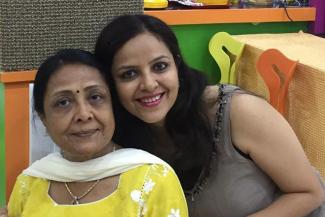
Payal talks about how she has seen her father deteriorate physically and mentally over the years due to stroke. She and her mother play an active role in his daily care which has become tougher over time.
Payal, tell us about your father’s condition?
My father had a brain stroke 15 years back and he has been slowly deteriorating day by day. He has lost most of his memory and struggles to even remember his children’s names. He often wanders off if left alone, so he needs to be monitored 24 hours a day. Years of diabetes and blood pressure have made it worse. In August of this year, he suffered another Ischemic stroke, where a clot caused blockage of the blood supply into the brain. This has led to significant brain damage with loss of various cognitive as well as physical functions.
He is now unable to use the toilet on his own, so needs someone to help him in the bathroom. He cannot swallow, so had to have a food pipe inserted into his stomach. He talks occasionally but usually is not comprehensible. He has lost awareness about his surroundings and does not know where it’s day or night. Memory is selective and fading. In addition, he got infected with pneumonia which set back his recovery and has made him weaker.
What adaptions did you have to make at home for him?
He is now mostly on bed rest. As a result we had to rent a hospital bed for him. He tends to fall while trying to climb out of the bed, accordingly guard rails are inserted on his cot. We also had to install physical restraints because he tries to pull out his food pipe. My parents live alone, so we have hired a male-aid to assist with my father’s care through the day. After his stroke, we did appoint a male nurse for a few weeks, but now continue to have a ward boy 24 hours.
How do you contribute towards the care for the patient? What role do you play?
My mother is primarily responsible for all of my father’s care including food and medicine. Food is now purely in liquid form that has to be poured down the pipe, every two hours. She does need a male attendant to help physically lift my father, escort him to the bathroom, take him for a walk for some physical movement, etc.
Both my siblings live out of India, so I’m the only one in close vicinity. I play back-up for my mom whenever possible so that she gets some time off every now and then.
How has the patient's care and illness affected you or changed your life?
For my mom, it has cut down on her social life but she has helpful neighbours which allows her to step out once in a while to go out for a dinner, her kirtans or a movie. My brother recently was in town so took her for a short 2 days trip to a famous temple at Srinathji. Relatives have been quite supportive and drop in to visit them often. Many relatives live in the same area as my parents, so it is easier for them to visit.
Since I do not stay with parents, my life is not directly affected but my mom is not able to help me with my kids like she used to. Earlier, she would pick up my children from school and babysit them till I came home from work. After the second stroke, my parents have been over at my house only a few times.
How do you cope with all this emotionally? What coping mechanism helped you?
I have to say, it has been a tough ride. We are now settling into it as time passes. While my mom does get frustrated and stressed, we find ways to make sure she never reaches her breaking point. We are financially happy to keep a ward boy employed for 24 hours. She likes spending time with her grandkids, so I take them over every other day. Once in a while, my husband sleeps over with my father, while my mom can get a night out at my place.
We have also been lucky to have supportive extended family staying around them who visit them often.
It is emotionally taxing to see your own dad suffering. I try and spend as much time as I can with my parents. I would take them out for short dinners, drive and to children’s play areas which cheered them up and in turn me. After the second stroke, we have not been able to take my father out much. I like spending some time with him, show him around the world on my I-pad and make sure the kids get to know him.
Keeping a stroke patient engaged and other caregiver tips
What has been the most challenging aspect of his care?
We feel that care of a person who is physically active but mentally incapacitated is very challenging. It’s like he is not with us mentally any more. He does not comprehend what is going on and why it is happening. For instance, he pulled out his catheter once and in the process ended up with a urinary tract infection. Such incidents are trying, as it is difficult to explain and for him to understand.
What is your advice to caregivers?
My advice would be to ask for help and don’t be shy about it. Create your support system and back-ups so that you are never in a state of absolute helplessness.
Update
It is with deep regret that we inform our readers, that Payal's dad passed away. However the experience and lessons that Payal shared are still useful to any other family dealing with a similar situation.






